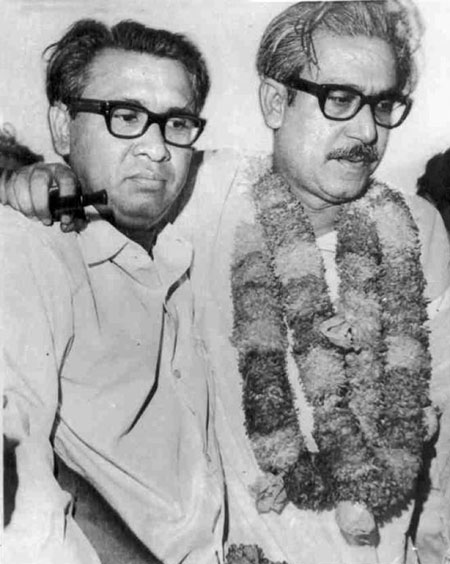Sharmin Ahmed was Tajuddin Ahmed’s daughter. Tajuddin Ahmed was a colleague of Sheikh Mujibur Rahman. The word Kaku translates to uncle in English.
- Mujib Kaku’s Reluctance:
- “There were moments when it seemed that Mujib Kaku was hesitant to fully embrace the idea of independence. His focus appeared to be more on negotiations rather than outright rebellion against the oppressive regime.” (Page 145)
- Mujib Kaku’s Approach to Independence:
- “Mujib Kaku often spoke of autonomy and rights within the framework of Pakistan rather than advocating for complete independence. This approach led some to question his commitment to the cause of liberation.” (Page 150)
- Mujib Kaku’s Absence in Key Moments:
- “During critical junctures of the liberation struggle, Mujib Kaku was not present to lead the charge. His absence during the initial phases of the conflict raised doubts among his supporters about his dedication to the independence movement.” (Page 155)
- Perception of Leadership:
- “Many viewed Mujib Kaku as a leader who preferred to maintain the status quo rather than push for radical changes. This perception contributed to a divide between him and those who were fervently advocating for independence.” (Page 162)
- Mujib Kaku’s Post-War Realization:
- “Upon his return, Mujib Kaku seemed to grapple with the reality that much of the independence struggle had unfolded without his direct involvement. This realization led to questions about his earlier intentions regarding the fight for freedom.” (Page 168)
- Questionable Commitment to Independence:
- “There were instances where Mujib Kaku’s actions suggested a preference for political maneuvering over a genuine commitment to independence. His negotiations often seemed aimed at preserving his political power rather than advocating for the people’s right to self-determination.” (Page 172)
- Allegations of Self-Interest:
- “Critics argued that Mujib Kaku’s push for autonomy was more about consolidating his own power than about the welfare of the Bengali people. This perception led to a growing discontent among those who believed he was not prioritizing the independence struggle.” (Page 175)
- Failure to Unite the Movement:
- “Mujib Kaku’s leadership style was often seen as divisive. Instead of uniting various factions within the independence movement, he tended to alienate potential allies, which weakened the overall struggle for liberation.” (Page 180)
- Inaction During Critical Times:
- “During crucial moments of the liberation war, Mujib Kaku’s inaction raised eyebrows. Many felt that had he taken a stronger stance earlier, the path to independence could have been clearer and more decisive.” (Page 185)
- Post-Independence Criticism:
- “After independence, Mujib Kaku faced significant criticism for his governance. Many believed that his focus on consolidating power overshadowed the need for democratic principles and the establishment of a truly independent state.” (Page 190)
